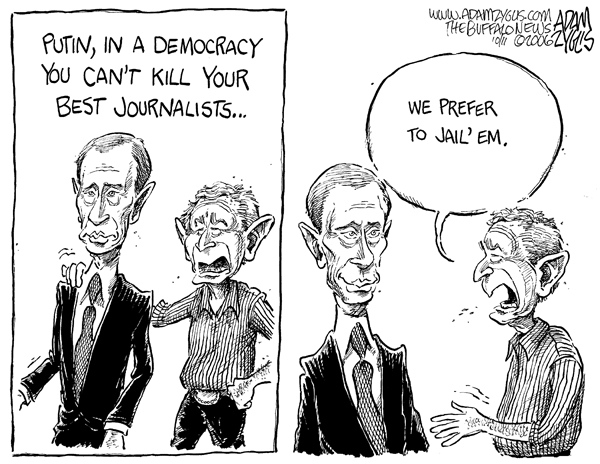
The case of a Fox News reporter under FBI surveillance shows that the right of journalists to protect the confidentiality of their sources is fiction in the United States.
Never before has a journalist in the U.S. been charged for attempting to get information. James Rosen, Fox News reporter, not only has that to worry about, but court documents have him as a participant in a “criminal conspiracy” that resulted in the violation of state secrets. That alone is astonishing because freedom of the press is sacred in the U.S.
In the summer of 2009, citing anonymous sources, Rosen wrote on the Fox News website that the CIA had prepared a confidential report about North Korea’s nuclear program and sent it to dozens of government officials, including President Barack Obama. As the U.N. debated sanctions against the North’s regime, the CIA warned that if they were adopted, Pyongyang would take “revenge” involving the staging of nuclear tests.
The U.S. Department of Justice ordered an investigation to determine the source of the leak. Taking into account phone records on the day the article was published, the journalist was found to have met with Stephen Jin-Woo Kim, a State Department adviser who knew the contents of the CIA report.
The FBI asked Google for access to Rosen’s Gmail account. As Google itself recently revealed, last year certain U.S. government offices made almost 14,000 similar requests demanding access to Gmail users’ mailboxes. Access was granted in 90 percent of those cases, despite the fact that a warrant accompanied only every fifth request. The majority of letters sent to Google are signed by prosecutors or investigators.
In this case, the FBI asked the court for a search warrant, arguing that the journalist was probably “engaged in a criminal conspiracy.” Along with access to Rosen’s mailbox, FBI agents demanded secrecy: Rosen was not to be made aware that his emails were being read.
The judge whom the FBI visited agreed to issue a search warrant but decided that Rosen should be informed about the situation. The DOJ asked another judge, who issued the same decision. Finally a third judge agreed to the “secret” search, allowing the emails to be viewed without Rosen’s knowledge.
Only when The Washington Post and The New Yorker reported on the matter did the Fox News reporter realize his emails were being read by the FBI.
His mailbox contained evidence that Kim was actually the source of the leak. Kim will face charges for violating state secrets; the process will begin next year.
Rosen is not expected to be formally accused of anything; even so, the whole story is shocking, and more so because this is not the first time such a scenario has occurred.
Only a short while ago it was discovered that the DOJ acquired the telephone records of 20 Associated Press journalists. The purpose was to find the source of a leak in a case involving the CIA’s disruption of a plane attack planned by Yemeni terrorists.
Essentially, with the Obama administration’s current interpretation of the law and the near limitless possibilities of electronic surveillance, the right of journalists to protect the confidentiality of their sources is fiction in the United States.
Gmail users — there are currently about 450 million — and users of other email services have something to think about. It turns out that U.S. law enforcement can easily — and without court order — read user emails.
According to human rights defenders, the U.S. law on privacy in electronic communications, adopted in 1986 before the Internet became mainstream, simply does not fit today’s reality. For example, the law states that emails that have been on Google’s servers longer than 180 days are outside the account owner’s property and are therefore “abandoned.” These emails may be read without a warrant.
The American Civil Liberties Union recently acquired an FBI circular that shows that the agency interprets the law even more oddly: A judicial warrant is only required to read a user’s unopened emails if they are less than 180 days old. In the case of emails older than 180 days, opened or unopened, only a written request from the prosecutor is needed.
According to the Obama administration, this policy is not in violation of the Fourth Amendment, which protects citizens against unreasonable search.

Leave a Reply
You must be logged in to post a comment.